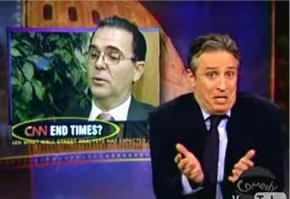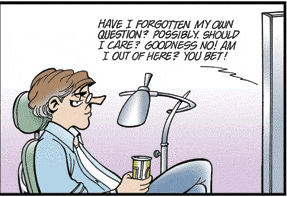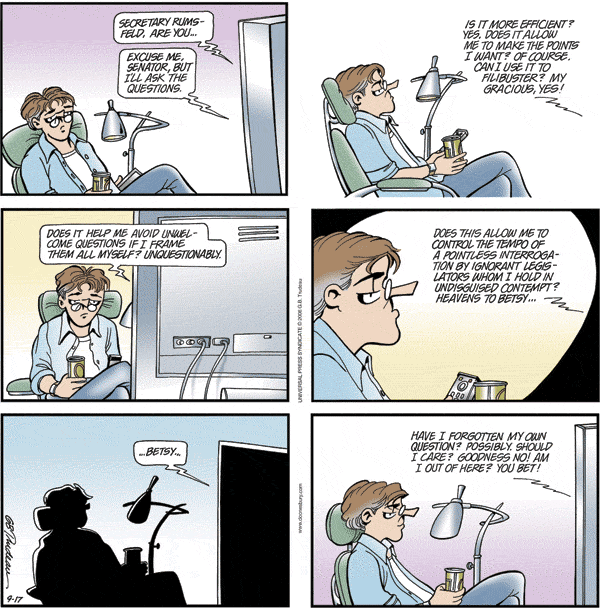September 17, 2006
Rhetorical questions: threat or menace?
 |
 |
Rhetorical questions have been in the fake news at least twice in the past week. And these treatments have not been just any old mentions of the phenomenon, they've commented on the distinct functions of fine distinctions among subtypes of rhetorical questions.
On the left is a bit from the Daily Show from 9/13/2006, and on the right, Doonesbury from 9/17/2006. Trudeau's strip satirizes Donald Rumsfeld's penchant for structuring his discourse as a series of self-addressed questions and audience-directed answers. Stewart observes that CNN uses question-marked story captions as a way to establish "existential" topics -- roughly Rumsfeld's method, though sometimes applied to flag outlandish subjects like "End Times" -- whereas Fox News uses rhetorical questions as a sneaky way to insinuate things that it doesn't dare assert. Stewart parodies this by ending the segment with the title "The Question Mark: A Prophylactic Protecting Fox News from Anything it might Contract During its Extensive GOP C**ksucking?"
 |
Fox is not the inventor of the technique that Stewart complains about, obviously -- Fev at Headsup has been complaining for some time the use of questions in headlines (e.g. here, here, here), focusing especially on cases where the question mark is used as a form of attribution (headline "Was grudge factor in death?", subhead "Suspect in patient's death said victim stole her boyfriend, woman says detective told her").
Scanning the internets for other commentary, I stumbled over something called Davis's Law: If a headline ends in a question mark, the answer is "no". I interpret this to mean "if a headline seems to ask a yes/no question, the headline writer wants you to think 'yes' at least long enough to read the story, but the true answer will probably be 'no' or at least least 'no one has a clue'". However, looking over uses of the technique in the annals of Language Log (we're not afraid to examine our own practices here -- and if rhetorical questions are outlawed, only Fox News will have rhetorical questions), the intended answer often seems to be "well, sort of": "Is 'singular they' verbally and plenarily inspired of God?"; "An editorial conflict of interest at Slate?"; "Can Derrida be even wrong?"
Anyhow, this all suggests a set of non-rhetorical questions about rhetorical questions, and Google Scholar indicates that there are 89,200 answers out there. The Daily Show needs a staff linguist, don't you think?
[Daily Show tips from David Donnell and Jake Tolbert]
[By the way, there seems to be a completely unrelated Davis's Law dealing with muscle physiology, variously quoted on the internets as "Soft tissue models along the line of stress" or "Muscles which are held in a shortened position will increase in tonus" or "The contraction of a muscle will also set off a contraction of the adjacent muscles".]
[Update -- Don Porges writes:
http://www.online-literature.com/orwell/1984/4/:
Winston thought for a moment, then pulled the speakwrite towards him and began dictating in Big Brother's familiar style: a style at once military and pedantic, and, because of a trick of asking questions and then promptly answering them ('What lessons do we learn from this fact, comrades? The lesson -- which is also one of the fundamental principles of Ingsoc -- that,' etc., etc.), easy to imitate.
Rumsfeld's characteristic use of the self-answered question is different, at least according to my memory. The questions that he asks are his version of (some of) the hard and even hostile questions that he expects his audience to want answers to. The fact that he asks them himself is disarming, but of course it also allows him to choose the terms of both sides of the debate.]
Posted by Mark Liberman at September 17, 2006 08:57 AM